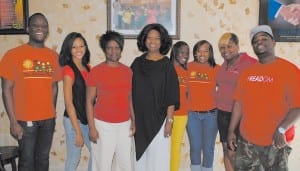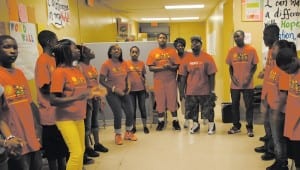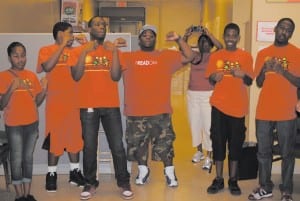

At 8:30 a.m., Friday, June 29, 2012, a hot breakfast was served before the “Harambee (pronounced hah-rahm-beh)” practice was set into motion: a process which included invited guest, Opa-locka Commissioner Rose Tydus, reading a motivational story to approximately 50 youths registered at the Children’s Defense Fund (CDF) Freedom School located at Teen Upward Bound (TUB), 3869 N.W. 125th street, Opa-locka, Florida, in part funded by the Children’s Trust and Miami- Dade County . First to greet visitors, and most eager to explain the concept of “Harambee,” was University of Miami Music Education student, Najjah Thompson, a third year Servant Leader Intern (one of seven at TUB) required to received training by the Freedom School at the Alex Haley Farm in Clinton, Tennessee. After a few minutes of detailing the theory behind “Harambee,” eventually Najjah determined that the best explanation one could receive would be the experience itself. Thus, “Harambee” began with full corporation and participation of the entire camp, as they ignited the room with clapping, and stepping, while singing “A Good Morning Song,” followed by “Hallelujah,” and “It’s Friday at “Harambee,” to welcome into the group, Commissioner Tydus.

In Kenya, “Harambee,” Swahili for “Let’s Pull Together,” began as a community self-help or activity development event. It ranged from informal affairs, lasting a few hours, to formal multi-day events, as a method of building and maintaining communities. In 1963, the first Prime Minister (later to become the first President of Kenya), Jomo Kenyatta adopted “Harambee” as a concept of pulling the country together to build a new Nation; encouraging communities to work collectively to raise funds for an assortment of local projects.
Between June 11 and August 10, 2012, “Harambee,” initiates the day at the Freedom School at TUB. There, “Harambee” is translated into a daily, 30- minute tradition of informal sharing, where students and staff unite in a group-affirming celebration and preparation for the work ahead. “Harambee” consist of five components (reading aloud, motivational songs, cheers/chants, recognition/announcements and a moment of silence), which “kick-starts” a positive attitude at the onset of each day. Playful, challenging, creative and upbeat motivational songs either proceed or follow each of the five components of “Harambee.” Youth participants offer congratulatory remarks with the intent of encouraging constructive contribution, optimism, productivity and accomplishment. Commissioner Tydus, who is an advocate for education, became involved in “Harambee” two-years prior. Being familiar with the excitement that this morning routine generates, she eagerly accepted the invitation from Freedom School administrators to return again this year. On this day, the “wake-up” call began moments before the Commissioner took to her seat to begin reading, an “inspirational” chapter from Obama: The Historic Journey. The collective energy of the room was so exhilarating that the force spread from the campers into the feet and hands of the observers who also began clapping with the camp.

Freedom Schools began in the U.S. in 1964, during the Civil Rights era. Currently there are over 80 Freedom schools in cities across the U.S. Opa-locka has the only level four ‘school’ in the State of Florida. The CDF Freedom School program teaches tools and boost student motivation to read, generates optimistic attitudes toward learning, and connects the needs of children and families to the resources of their communities; platforms which Commissioner Tydus continuously promotes during her initiatives.
In Tydus’ prelude to the President Obama story, she noted to students, “It (reading) took me to places I would have never been able to afford, allowed me to meet people I would never have known, given me an understanding for things I wanted to know, along with a desire to achieve!” As the students listened attentively, the Commissioner began narrating the account of the first African-American President’s successful voyage to the Whitehouse. She explained, “I wanted them to understand the humble beginnings of one of the most important figures in the free world, and to realize that where you begin, does not determine where you will end.” She said she chose a book and a man that the campers would find similarities or with whom they may perhaps make a connection. She also insisted that the youth discover the purpose for which they were born and, “Don’t” miss out on it.” Finally, Tydus asked everyone to do something they are used to doing during Harambee, “clap to the beat, as I recited a poem I that wrote to describe each and every one of you, who has a distinct and unique gift, personality, fingerprint and DNA…it’s called ‘Designer Original.’” At which everyone was obliged, and most surprised with the Commissioner’s ability to “rap.”

At the conclusion of the Commissioner’s contribution to “Harambee,” The youth followed-up with a series of songs and remixes to the tune of… “Good Job,” “Real Cool Cool Cat,” and “Recognition.” The latter, dedicating appreciation not only to the Commissioner, but for one another. “I have a recognition…” students randomly raise their hands to be acknowledged by Servant Leaders, so that they might be selected to “recognize” an accomplishment, a special occasion or any other important observation related to anyone in the room, from the guests to a fellow classmate or staff member.
“Harambee,” provokes attention, concentration, focus, obedience, behavior and the unification of the entire group of students who were balanced, well-mannered, behaved and exceptionally considerate of each other.
Director Jannie Russell, Assistant Program Director/Site Coordinator Chandra D. Russell along with Najjah Thompson, the remaining Servant Leader Interns and the entire staff of trained and skilled professionals, run a “well-oiled machine,” which has cultivated an atmosphere of excellence among the participants, through a superb operation of structured activities, communication, organization, positive energy, strength, discipline, agreement, understanding, mutual respect and harmony at the Children’s Defense Fund Freedom School.
Commissioner Tydus declared, “This is program of cooperative learning, where many of today’s young people could stand to benefit.” She continued, “You can’t manufacture the enthusiasm that these children displayed. They genuinely WANT to be in Freedom School.” The Commissioner concluded, “Sometimes tools, like ‘Harambee,’ have already been place on shelves by the hands of our ancestors and the visionaries that came long before us. Like Mrs. Russell, we just need more people to pick-up these tools, and begin showing our children how to work with them in order to build a better tomorrow!”





